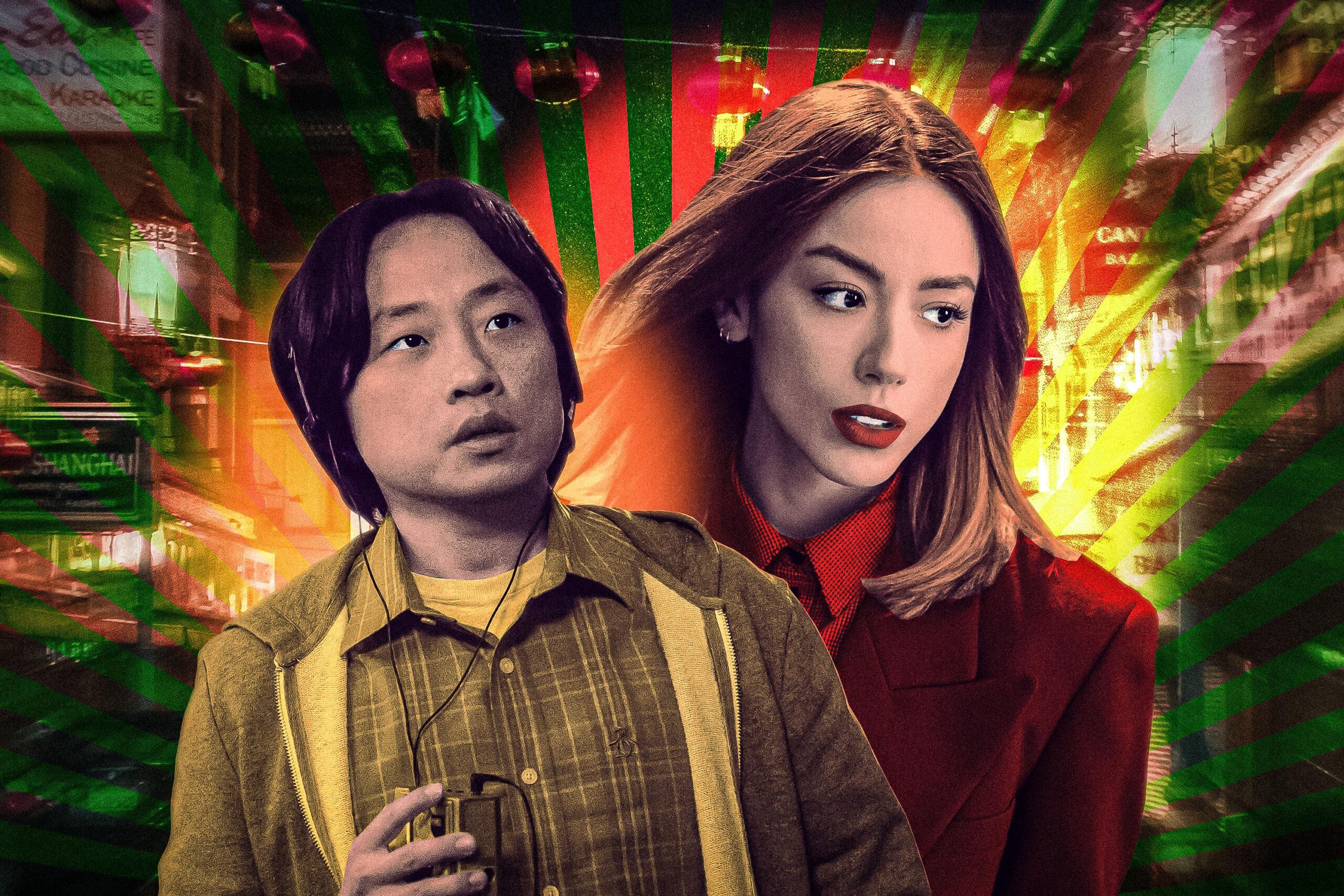

Charles Yu’s 2020 novel, Interior Chinatown, is a biting satire of the Asian stereotypes that American TV shows and films have turned into tropes and recycled in stories for generations. The book follows Willis Wu, a background actor on a Law & Order–style police procedural, as he tries to climb from the lowly status of Background Oriental Male to the best role that an Asian actor can attain: Kung Fu Guy. Written in the style of a screenplay, Interior Chinatown is a metafictional narrative that is both format bending and surreal; it’s a story about stories and the boundaries within them that have historically confined Asian American characters. Yu’s novel was hailed by critics as a funny, clever, and inventive takedown of Hollywood, and it won the National Book Award for Fiction.
When you revisit the novel in 2024, it’s hard not to notice how the Hollywood landscape has changed in the few years since Interior Chinatown was published, somewhat undermining the strength of its core message. Everything Everywhere All at Once won seven of the 11 nominations it received at the Academy Awards in 2023, including Best Picture. Romantic dramas, comedies, and coming-of-age films, as well as award-winning TV shows like Beef, The Sympathizer, and Shogun (although the last of those is set in feudal Japan, before the U.S. existed), have centered on Asian and Asian American characters. Recent studies have shown a rise in Asian representation on TV, even in leading roles. And now, Yu is adding to the list by adapting his critically acclaimed novel into a series about Asian American representation, as Interior Chinatown becomes a TV show in its own right.
On Tuesday, all 10 episodes of Interior Chinatown premiered on Hulu. Yu, whose past work in TV includes writing credits on HBO’s Westworld, FX’s Legion, and Disney+’s American Born Chinese, serves as the series’ creator and showrunner. The Hulu adaptation keeps the same basic premise as the novel, with Willis Wu (Jimmy O. Yang) dreaming of escaping his mundane everyday life as a waiter at the Golden Palace to become a part of something bigger. He’s still a background character on the show within the show, Black & White: Impossible Crimes Unit, but like everyone else on the (fictional) TV series, he doesn’t realize it. And Willis soon finds himself in a bigger role, at the center of a growing conspiracy that unearths the truth behind his family’s greatest trauma.
The Hulu series builds and expands on the book, fleshing out its supporting characters and the world of Interior Chinatown to better fit the narrative structure of a 10-episode season of TV. But in the process, its central concept gets stretched too thin. Interior Chinatown sacrifices some of the poignancy of the novel’s social commentary to focus on an earnest mystery that never quite jells with the story’s satirical nature.
(Fair warning: The remainder of this piece will contain some spoilers from the latter half of the TV series and the entire novel.)
Interior Chinatown starts off strong with a premiere directed by executive producer Taika Waititi (Thor: Ragnarok, Jojo Rabbit) and written by Yu himself. (It’s the sole episode directed by Waititi and one of just two written by Yu, who also authored the season finale.) The pilot, “Generic Asian Man,” begins with Willis lamenting to his friend and coworker Fatty Choi (Ronny Chieng) that he wishes he could be part of the kind of exciting police investigations that he hears about on the news, but that nothing interesting happens to guys like him and Fatty. Until it does: Willis witnesses a kidnapping outside the restaurant. Detective Lana Lee (Chloe Bennet) enlists Willis’s help on the case, and together they investigate a pattern of crimes in Chinatown that could finally explain what happened to Willis’s Older Brother (Chris Pang), who disappeared 12 years earlier.
Waititi is a natural fit to set the tone of the show, balancing the silliness of Interior Chinatown’s meta nature with the sincere drama buried at the heart of the story. “Generic Asian Man” quickly introduces Black & White—a sort of heightened version of Law & Order: SVU—as a dominating force that hijacks Willis’s story. Miles Turner (Sullivan Jones) and Sarah Green (Lisa Gilroy) star as the attractive detectives who quip and banter through every cracked case, while Willis becomes another nameless extra in the background. The opening episode also highlights the loss of Older Brother and how it hangs over the family like a dark cloud. Willis’s mother, Lily (Diana Lin), still grieves for her elder son, and Willis has a fraught relationship with his father, Joe (Tzi Ma), who always treated him as second to Older Brother, the pride and joy of Chinatown.
The series premiere maintains the spirit of the novel and sets Willis on a similar journey, echoing his aspirations to become Kung Fu Guy, just as Older Brother once was. “Ever since I was a boy, I’ve dreamt of being the hero,” Willis says early in the pilot. “To be in the spotlight. But that’s hard if you look like me. People don’t see you that way, if they see you at all. For a kid like me, there was one way out of Chinatown: kung fu.”
But as the season carries on, Interior Chinatown struggles to fit all of its moving parts together. Despite Yu’s experience in TV and the fact that he wrote the novel in the form of a screenplay, Interior Chinatown was always going to be a difficult text to adapt. (The author has even expressed that sentiment in the show’s press run.) Much of the book is told through Willis’s internal monologues and descriptions of other characters, and scenes from Black & White are easily distinguishable from Willis’s everyday reality thanks to the natural separation between pages and page breaks. It’s one thing to force the reader to use their imagination to visualize how this dynamic would work on a TV show and another challenge entirely to adapt it on-screen.
Yu’s answer was to take the book’s ideas and repackage them into a mystery series. “The elevator pitch is that it’s Law & Order meets The Truman Show,” Yu told The New York Times. “It starts as a straightforward mystery and gets into something weirder, a metaphysical mystery hopefully.”
It’s a significant departure from the book, which doesn’t feature much of a mystery at all. In the adaptation, Willis and Co. have no idea that they’re characters on Black & White, just as Jim Carrey’s Truman Burbank was initially unaware that he was living on a reality TV show in the The Truman Show. The way Interior Chinatown satirizes and plays around with the police procedural format calls to mind other recent TV series that aped TV genres within their own stories, like Marvel’s WandaVision and AMC’s Kevin Can F**K Himself.
Just as WandaVision transitions between the styles of different sitcom eras in each episode and Kevin Can F**k Himself uses varying camera setups and a laugh track to split the perspectives of its female protagonist and her sitcom husband, Interior Chinatown spoofs Law & Order through title cards, music cues, a case-of-the-week narrative structure, and harsh, blue lighting. While Interior Chinatown gets some solid mileage out of its Black & White setup, the gimmick loses its luster over time as it gets swallowed by the intensifying circumstances of Willis and Lana’s investigation.
The Hulu series likewise turns other plot points or jokes from the novel into more fodder for a genuine mystery. In the show, the disappearance of Older Brother serves as both the emotional foundation of Willis’s existential crisis and the unsolved case that brings him and Lana together. Older Brother has already disappeared by the start of the book’s story as well, but he returns to represent Willis in court as his lawyer. The book’s Older Brother casually explains that he simply left Chinatown to go to law school.
Similarly, one of the funnier conceits of Yu’s novel is the idea that there’s a required 45-day death period for actors like Willis after their character gets killed off. “Why forty-five days?” Yu writes. “It’s the minimum length necessary, just long enough for everyone to forget you existed. Because even though you all look alike, it’s still weird if you get murdered on Tuesday and by Thursday you’re showing up in the background of a street scene or as a busboy.”
In the adaptation, that death period is less of a commentary on the interchangeability of Asian actors to an audience who can’t tell them apart than it is a harrowing experience for the victims of the ongoing pattern of crimes in Chinatown. They still die and eventually cycle back in, but instead of being a punch line, it’s now a source of drama—or at least it’s supposed to be. However, the show’s satirical, metafictional approach—which includes the constant bending of the laws of nature in the world—undercuts any real chance for stakes to develop as the mystery reaches its climax. (In another death-defying moment from a different episode that illustrates this tonal push and pull, a bomb is set to go off in the police precinct, and though Detective Turner decides to do nothing about it, it magically disarms itself.)
By transforming Interior Chinatown into a mystery, the narrative also loses some of its focus on Willis’s journey of self-discovery as an extension of his own insecurities about being an Asian American. At the end of the novel, Older Brother defends Willis in court by essentially litigating the model minority myth and the Asian American experience, and the brothers are forced to fight their way out of the courtroom when all else fails. Such an absurd scenario likely never would have worked in a TV adaptation, but its end goal is wildly divergent from the direction the series takes instead. Perhaps in part due to the increased diversity of roles in recent years for Asians and Asians Americans in Hollywood—the Kung Fu Guy is no longer the only covetable opportunity available—Willis’s motivations in the Hulu series are ultimately less concerned with actual punches and kicks than about becoming the Main Character.
Although Interior Chinatown deprioritizes some of the book’s focus on kung fu, the adaptation still applies other concepts from the novel that feel current despite the strides in representation. Just as Willis has to climb the Asian acting hierarchy in the novel, Yang’s Willis is able to break through the inexplicable barriers that prevent him from navigating the physical space of Black & White only by switching in and out of the kinds of supporting roles that Asian and Asian American actors are often relegated to in stories where their characters aren’t the primary focus. Willis changes from Waiter to Delivery Guy, and he’s even able to replace the police precinct’s Tech Guy (who is of Southeast Asian descent) without anyone noticing. Ultimately, all Willis really wants is to shake his lifelong feeling of being invisible and overlooked, an experience that many Asian Americans can relate to.
The series also improves on the book in a major way, as it develops a strong cast of characters to support Yang’s Willis. The novel was ultimately more concerned with exploring archetypes than it was with any single individual beyond Willis, so there’s a lack of compelling characters in the source material that the show works hard to rectify.
On-screen, Fatty Choi is upgraded from a minor character to the show’s most consistent source of humor; Chieng thrives in the role of an unambitious restaurant worker who becomes popular among white patrons after word spreads of his blatant rudeness to customers. Bennet helps transform Lana Lee into a more dynamic second lead than her book counterpart, Detective Karen Lee: She’s more than just Willis’s love interest, as Lana’s backstory gets tied to Older Brother’s disappearance. And Lin’s Lily Wu gets an entire arc of her own: After always being only a mother and a wife to Joe, the former crowd-pleasing sifu, Lily decides to live a life of her own and become a real estate agent. The development opens up the opportunity for Interior Chinatown to explore the sacrifices of motherhood, as well as gentrification, as Lily’s company looks into renovating the neighborhood and risks pricing out its longtime residents.
What with the show’s metafictional approach, its satire about Asian American representation, the expansion of its characters, and the mystery connecting them all, there’s a lot happening in Interior Chinatown. The series gets a little lost in its ambitious narrative structure, but it still achieves its original objective of satirizing Asian American stereotypes in mainstream media—even though the show’s commentary is more muddled than it is in the book’s consolidated vision. Record-breaking award runs by Asian- and Asian American–centered projects, and historic firsts from the actors of Asian descent that propel them, may create the illusion that there is no more need for social commentaries like Interior Chinatown. But the progress signified by the show’s spotlighting and deconstruction of long-standing tropes and stereotypes in American media only reinforces the need for more narratives like these, no matter the growing pains.


